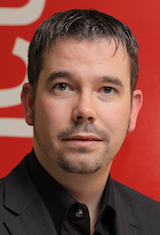 You don't need to be Einstein to figure out the future of numbers, according to ICUK's founding Director Paul Barnett, who proposes a radical rethink of the number porting process based on common sense principles.
You don't need to be Einstein to figure out the future of numbers, according to ICUK's founding Director Paul Barnett, who proposes a radical rethink of the number porting process based on common sense principles.
Barnett has hurled his thoughts 'out there' and is seeking a mandate to overturn the immovable object of the number porting process. His long-term campaign for fundamental change starts here, revealed as a thought-provoking exercise that, he says, simply cannot be rejected - such is the strength of his belief in the need for a full blown revolution.
"I propose some out-of-the box thinking on how we see and interact with phone numbers in the future," stated Barnett. "We all know how frustrating and antiquated the number porting process can be. It's time for a radical change. Although there will inevitably be technical limitations or complexities, my aim is to encourage thought leadership that delivers a solution and rids this industry of the current porting systems and their limitations."
For Barnett, maintaining the status quo is inconceivable, but to win such a vote for change would need a Herculean exercise in cross-industry persuasion. "What I propose is a model similar to that of transferring a .uk domain name with Nominet," he explained. "The Nominet model is unique in the world of domains, in as much as a tag is assigned to a domain and this determines who controls the domain on behalf of the customer. The tag can change from provider to provider with ease, securely and with minimal barriers. Even if the losing provider puts up their own barriers to migration, the tag can still be changed by the owner via Nominet.
"When put into perspective, a number could have a tag which determines who looks after it from a billing and 999 perspective, and instead of name servers for domain DNS handling, you have an equivalent detailing routing for calls. Thus, a number could be held by one provider, a number facilitator, and calls handled by another."
Barnett's plan is to develop a consensus of thought leaders who together could forge a feasible case for change. "We have operated with the current porting model for many years now," added Barnett. "We have all grumbled about it, but see very little in the way of change or improvement from Ofcom.
Alternatives to the existing model have been proposed in the past, but nothing has been followed through. Why not take the chance to remove Ofcom from the equation and design a better solution whereby we can rid ourselves of old world thinking?"
This is a phenomenal approach that makes perfect sense, according to Barnett, who is seeking allies to join his rolling campaign convoy. "We all see a world that is steadily moving towards VoIP, and the traditional physical barriers to exchange boundaries are no longer prevalent," he added. "Yet, in some places number ranges are so scarce that clients aren't able to get numbers that belong to a particular area, with 0207 being the most notable example.
"Is it time that we design a new numbering solution with long-term ambitions to replace the system we know, and from an industry perspective, get frustrated with? Could a new system ensure that we deliver a long-term number solution without the need to change it again in a decade? Is it deemed necessary for geographic boundaries to still play a part? Could a replacement be operated outside of Ofcom, UK Government control, or even country boundaries? Could a replacement be simple enough to remember, having seen the slow adoption of IPv6 where the complexities and misunderstandings are stifling any enthusiasm for change?"
This probing set of questions exposes the limitations of the current numbering system, claims Barnett. On the other hand, he noted that the Internet has no boundaries. "The future of telephony is inextricably linked to data, so why introduce barrier limitations over how we identify and make calls to one another?," he asked. "Sure, it's helpful sometimes to know what country you are calling, but that's mainly from a billing perspective. In a world of data, why should the distance data has travelled dictate cost? The handling of numbers in a virtual space has blended perceptions about who you are calling. No longer is the local number you are dialling guaranteed to be a neighbour."
Having felled all arguments in favour of keeping the current system, Barnett turned his attention to other areas of concern: "Could operating this on an international level help tackle areas such as security, provide a fairer solution for poorer countries, ensure international standardisation for emergency contact information, not to mention the ability to freely trade and transfer numbers between providers?," he said.
"With the move towards VoIP assured, real change is needed. If we can't easily improve on porting as we know it, a coalition of radical thinking must be deployed. It's time to debate how a national, or even international numbering solution, could be designed with the next generation telephony at its core."
